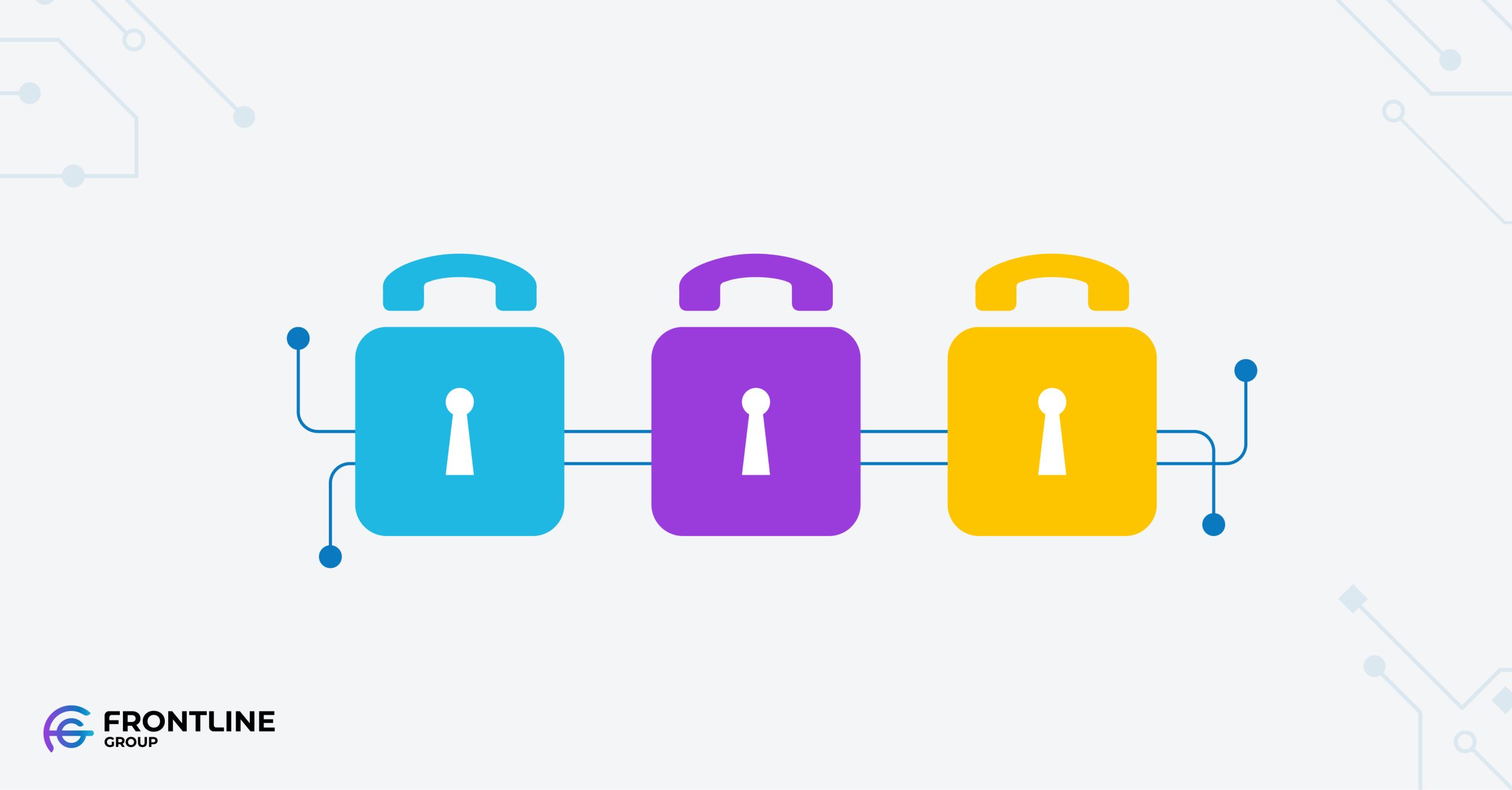
In today’s digital age, data security is becoming more and more important for maintaining customer trust and ensuring the smooth operation of contact centers. The repercussions of data breaches can be severe, affecting both businesses and customers alike. Recently, the world witnessed the impact of data mismanagement with CrowdStrike’s faulty Microsoft Windows update. This incident, although not malicious, caused significant disruptions across critical infrastructure globally, highlighting the importance of robust data security measures.
Let’s explore the importance of data security in contact centers, the key threats they face, best practices for ensuring data protection, and how Frontline Group is committed to safeguarding customer information.
Understanding Data Security in Contact Centers
What is Data Security?
Data security involves the practices and technologies used to protect digital information from unauthorized access, theft, or damage throughout its lifecycle. In the context of contact centers, data security encompasses a wide range of measures designed to safeguard sensitive customer information, including personal details, payment data, and interaction records. The primary goal of data security is to ensure the confidentiality, integrity, and availability of data.
- Confidentiality: Ensuring that sensitive information is accessible only to those authorized to view it. This involves implementing access controls and encryption to prevent unauthorized access.
- Integrity: Maintaining the accuracy and completeness of data. Measures such as checksums, hashing, and version control help detect and prevent data corruption or unauthorized modifications.
- Availability: Ensuring that data is accessible to authorized users when needed. This involves measures such as regular backups, disaster recovery plans, and network redundancy to prevent downtime and data loss.
What Types of Data are Handled by Contact Centers
Contact centers handle various types of data, including:
- Customer Information: Names, addresses, phone numbers, and email addresses.
- Payment Details: Credit card numbers, banking information, and transaction records.
- Interaction Records: Call recordings, chat logs, and email correspondences.
- Technical Data: System logs, troubleshooting information, and usage statistics.
The Role of Data Security in Maintaining Customer Trust and Compliance
Maintaining robust data security is crucial for preserving customer trust. Customers entrust contact centers with their sensitive information, expecting it to be handled securely. Additionally, data security is vital for regulatory compliance. Laws such as the General Data Protection Regulation (GDPR) and the Health Insurance Portability and Accountability Act (HIPAA) impose strict requirements on how customer data should be protected and managed. Non-compliance can result in severe penalties and reputational damage.
Key Threats to Data Security in Contact Centers
Cyber Attacks
Cyber attacks are a significant threat to data security in contact centers. These attacks can take various forms, including:
Phishing: Phishing attacks involve sending deceptive emails or messages that appear to be from trusted sources, tricking recipients into revealing sensitive information such as login credentials or financial details. Phishing attacks can be highly targeted (spear phishing) or widespread.
Malware: Malware is malicious software designed to infiltrate, damage, or disable computers and networks. Common types of malware include viruses, which spread from one system to another, and trojans, which disguise themselves as legitimate software to gain unauthorized access.
Ransomware: Ransomware is a type of malware that encrypts a victim’s data, rendering it inaccessible until a ransom is paid to the attacker for the decryption key. Ransomware attacks can disrupt business operations and lead to significant financial losses.
Insider Threats
Insider threats pose risks from within the organization. These can include:
Disgruntled Employees: Individuals who misuse their access to steal or damage data.
Third-Party Vendors: External partners who may have access to sensitive data and could inadvertently or intentionally compromise it.
Data Breaches
Data breaches can occur due to various reasons, such as weak security protocols, human error, or system vulnerabilities. The consequences of data breaches include financial losses, legal penalties, and reputational damage.
Physical Security Threats
Physical threats involve unauthorized access to data through physical means. This can include:
Unauthorized Access: Individuals gain access to secure areas where sensitive data is stored.
Theft of Devices: Loss or theft of devices such as laptops, smartphones, or USB drives containing sensitive information.
Best Practices for Ensuring Data Security
Data Encryption
Data encryption is a fundamental practice that ensures sensitive information is protected both in transit and at rest. By converting data into an unreadable format, encryption prevents unauthorized access, ensuring that even if data is intercepted, it cannot be understood without the decryption key. Implementing strong encryption protocols is essential for safeguarding customer information and maintaining data integrity.
Access Controls
Implementing robust access controls is crucial for ensuring that only authorized personnel can access sensitive data. This includes role-based access controls, which limit access based on an individual’s job function, and multi-factor authentication (MFA), which adds an extra layer of security by requiring multiple forms of verification. These measures help prevent unauthorized access and reduce the risk of data breaches.
Regular Audits and Monitoring
Continuous monitoring and regular audits are vital for maintaining data security. Monitoring tools can detect suspicious activities and potential security breaches in real time, allowing for prompt action. Regular audits help identify vulnerabilities and ensure compliance with security policies and regulations. By consistently reviewing and updating security practices, contact centers can stay ahead of potential threats.
Employee Training
Employee training programs are essential for raising awareness about data security risks and best practices. Training should cover topics such as recognizing phishing attempts, safe handling of sensitive information, and the importance of following security protocols. Well-informed employees are a crucial line of defense against security breaches, as human error is often a significant factor in data breaches.
Compliance with Regulations
Compliance with relevant data protection regulations is crucial for maintaining data security and avoiding legal penalties. Regulations such as the General Data Protection Regulation (GDPR), the Health Insurance Portability and Accountability Act (HIPAA), and the California Consumer Privacy Act (CCPA) set strict guidelines for how customer data should be handled and protected. Ensuring compliance with these regulations helps protect customer data and build trust with clients.
How Frontline Group Ensures Data Security
At Frontline Group, data security is a top priority. We employ advanced technologies and robust protocols to protect sensitive customer information. Our data security measures include:
Advanced Encryption: We utilize strong encryption methods to secure data both in transit and at rest.
Strict Access Controls: Our access control systems ensure that only authorized personnel can access sensitive data.
Continuous Monitoring: We use advanced monitoring tools to detect and respond to potential security threats in real time.
Employee Training: Regular training programs ensure that our staff is well-versed in data security best practices.
Why Choose Frontline Call Center
Frontline Call Center is committed to providing exceptional service while maintaining the highest standards of data security. Our protocols are designed to ensure that customer information is protected at all times, making us a trusted partner for businesses looking to safeguard their data.
Comprehensive Security Measures: We implement comprehensive security measures that cover all aspects of data protection, from encryption to access controls and continuous monitoring. These measures ensure that your data is secure from unauthorized access and potential breaches.
Compliance with Regulations: Our protocols comply with all relevant data protection regulations, including GDPR, HIPAA, and CCPA. This compliance ensures that your business meets legal requirements and avoids potential penalties.
Tailored Solutions: We understand that each business has unique needs. Our data security protocols are tailored to meet the specific requirements of our clients, providing customized solutions that enhance data protection.
Expertise and Experience: With years of experience in the contact center industry, Frontline Call Center has developed a deep understanding of data security best practices. Our team of experts is dedicated to maintaining the highest standards of security and protecting your valuable information.
Work With Us
Data security in contact centers is more important than ever, given the sensitive nature of the information handled. By implementing best practices such as data encryption, robust access controls, regular audits, employee training, and compliance with regulations, contact centers can protect customer data and maintain trust.
Frontline Group is committed to ensuring data security for its clients through advanced technologies and rigorous protocols. Contact us today to learn more about our secure and reliable contact center solutions.

Every business is different, that’s why all of our solutions are custom built for you. Let’s chat and see how we can help improve your contact center.

